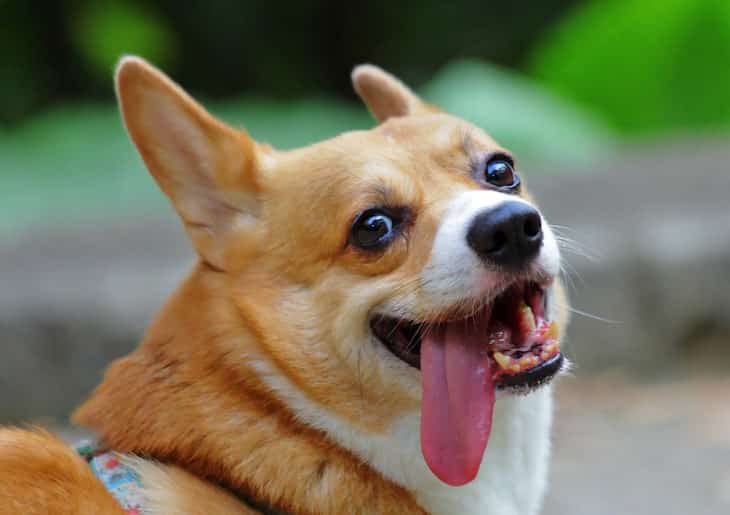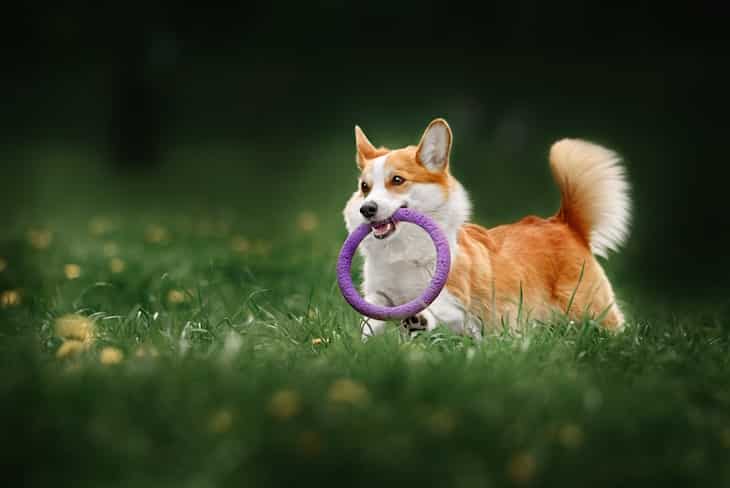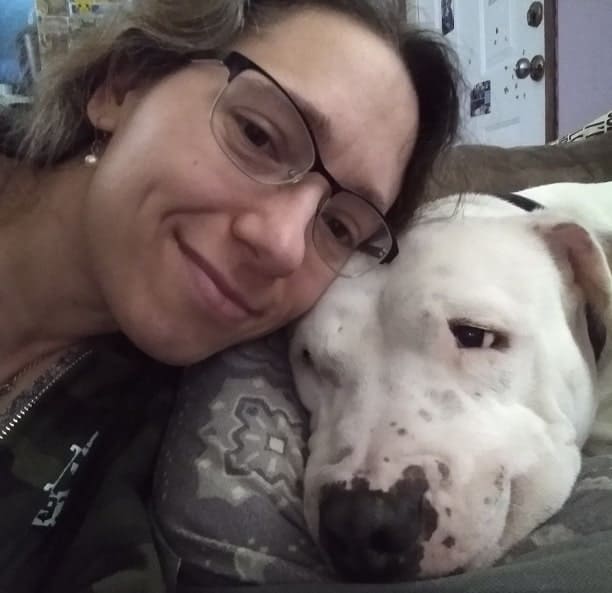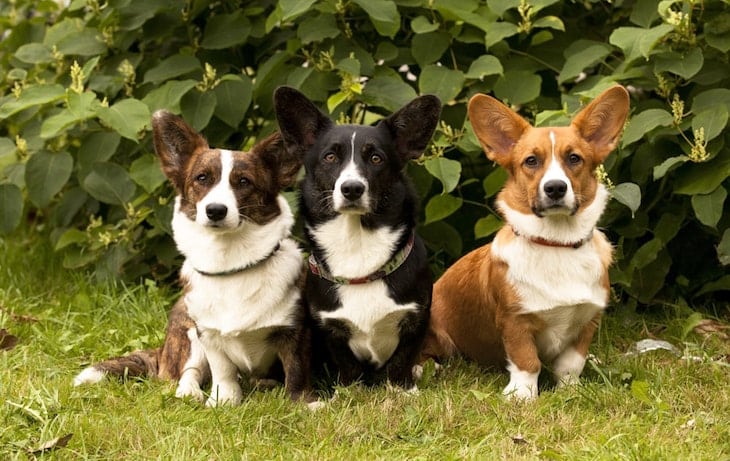The adorable Pembroke Welsh Corgi temperament will draw you in from the moment you first encounter him.
Before we dive into the various temperament traits you need to be aware of…
The Pembroke Welsh Corgi Temperament and Personality
While all dogs are individuals with their own personalities, here are a few things that typically remain true of the Pembroke Welsh Corgi temperament across the board:
He's A Barker
One thing you have to know right up front about the Pembroke Welsh Corgi is that he's a barker.
He will bark at anything and everything that crosses his path. If this is going to annoy you, then this is not the dog for you.
You may be able to train him to only use his bark when necessary, but you should be aware of this tendency in case you aren't able to catch it early enough to nip it in the bud from the get-go.
His barking stems from his history as a farm dog and his bold, protective temperament traits. He would bark as a kind of alarm to alert his masters if strangers were nearby, presumably to protect the livestock.

Watch Him Around Children
Another thing you may not like about the Pembroke Welsh Corgi temperament is that his herding instinct may inspire him to nip at children's heels to “herd” them.
Of course, this doesn't hurt the children, but it may scare them and/or become annoying.
You should train him out of this and make sure he understands that this sort of behavior is not acceptable.
Corgis tend to be better with children if they see the children as being higher than them in the pack order – so, older children.
He Loves Family Time
While the Pembroke is a herder at heart, he prefers to spend quality time with his family whenever he gets the chance.
In other words, just because he loves to herd doesn't mean you should keep him outside. There's a time for play, and there's a time to come in and be with your loved ones.
The Pembroke Welsh Corgi exhibits a friendly, outgoing and playful temperament – exactly what you want in a family pet.
He will do well in any living situation, so long as he gets his daily exercise.
As with all dogs, the sooner you socialize your Corgi, the better he will do with other people and animals.
Intelligent
Intelligence in a dog is both a blessing and a curse. It makes training him much easier, but if you don’t constantly challenge him, he will get bored and turn destructive.
Not only that, but intelligence can also lead to stubbornness. He knows what you want him to do, and he’s confident that he can do it. He just doesn’t feel like listening to you right now.
You can train him out of these negative traits with patience and persistence.
Friendly
He is polite to guests, though if he doesn’t know them, he will remain reserved. This may make people think he’s aloof, but really, he’s just keeping his guard up until he gets to know you better.
Bold
While the Pembroke is fine with family pets, he can be rather bold with animals outside the house. Short stature aside, he is territorial when it comes to his own property.
This has less to do with acting like a guard dog and more to do with his background. His ancestors worked as farm dogs and would chase stray animals away from the farm.
In fact, this makes the Pembroke a great dog to have around horses and other livestock that need guarding. While he’s great at guarding livestock, he’s not so great at guarding your house.
Playful
The Corgi is the kind of dog who loves to play, so long as there’s an objective involved. Chasing balls and Frisbees, herding, and agility exercises are all ideal for strengthening both the Corgi’s physical and mental muscles.
He’s smart, and he loves to work – so why deny him? Put him to work, and he’ll gladly oblige.
Not only that, but a dog with a playful nature who doesn’t get enough play can turn destructive on a dime. Keep him busy, and you’ll be able to keep your rose garden!
Did You Know?
There are two Corgi breeds: the Pembroke and the Cardigan. The Pembroke is the younger of the two and, interestingly, he is also more popular than the Cardigan. It's easy to remember which Corgi is the Pembroke because the Pembroke is the one without a tail.
Fun fact: The words “cor” and “gi” mean “dwarf dog” in Welsh. The Corgi, may not seem like a very fast dog, considering how long he is. But he is actually part of the herding dog family, and he's a fast little one at that! You have to be fast to be a herding dog. How else are you going to round up all those sheep or cattle – especially when you have the small legs of a Corgi?
A Brief History of the Pembroke Welsh Corgi Breed
If you’ve ever watched the Netflix series The Crown, then you’ve seen a Pembroke Welsh Corgi.
While these Corgis have been on the decline in the UK where they originated, the AKC credits The Crown for the breed’s increased popularity in the U.S.
Experts believe Flemish weavers brought the Pembroke Welsh Corgi with them when they emigrated to Wales. Experts have also traced the dog’s lineage to as far back as 1107 A.D.
Pembroke Welsh Training
The Corgi is like other small dogs in that he is both smart and stubborn. He can learn quickly, but only if he feels like listening.
This can have a negative impact on housebreaking him, as well as on additional dog training you may wish to conduct.
As with all dogs, it is important that you remain firm and consistent when training your Corgi.
If he gets the sense you’re giving up on him, then he’ll give up, too. And then all your prior struggles with him will have been for naught.
Helpful Dog Training Resource:
For help with training your Pembroke Welsh Corgi dog, you should take a look at The Online Dog Trainer by Doggy Dan. Doggy Dan is an expert Dog Trainer based in New Zealand. His online resource contains Hundreds of Excellent Dog Training Videos that will take you step-by-step through the process of developing a healthy, happy well-behaved dog.
The Pembroke Welsh Corgi Appearance
Pembroke Welsh Corgi Height and Weight
- Both male and female adult Pembroke Welsh Corgis range in height from 10 to 12 inches tall.
- As for weight;
- Males weigh between 22 and 31 lbs.
- Females weigh between 22 and 29 lbs.
Pembroke Welsh Corgi Colors
As far as colors go, the Pembroke Welsh Corgi comes in:
- Combinations of black and tan or white
- Fawn
- Sable
- Blue
- Red
Grooming a Pembroke Welsh Corgi
Corgis are no different from other dogs in that their nails need to be routinely clipped, and their ears and eyes cleaned to prevent buildup.
Does a Pembroke Welsh Corgi Shed?
The Pembroke is indeed a shedder, with his busiest period being from late spring into early summer.
Brushing him once a day should be enough to keep your carpets clean.
During shedding season, it may be easier to give him a bath first to loosen all the dead hair. Just make sure he's completely dry before trying to brush him.
Hypoallergenic?
The Pembroke is not, what you could consider a “hypoallergenic” dog. That is, if you have allergies, then this is not a good breed for you.
We compiled a list of ‘hypoallergenic dogs' here that you can check out.
Here are 10 Do It Yourself Grooming Tips you can follow.
Staying Healthy: Pembroke Welsh Corgi Health Issues and Resources
A healthy Pembroke Corgi has a life expectancy of 12 to 13 years, which is slightly higher than some of his small-dog counterparts.
Healthy Corgis also weigh a maximum of 30 lbs.
Pembroke Corgis are typically healthy dogs. However, some health concerns to watch out for are the same that plague other small dogs, including:
- Elbow dysplasia
- Hip dysplasia
- Bleeding disorders, like Von Willebrand's disease
- Eye problems
- Heart problems
- Degenerative Myelopathy(spinal disorder)
It is especially important that you monitor your Corgi's diet. This is because Corgis are infamous for stuffing their faces, so obesity can quickly become an issue – as can the ailments that come with it.
This is also true for training. Don't overdo it on the edible rewards. Be sparser with the treats and ampler with praise.
Helpful Dog Health Resource
Note: Our Health is #1 Priority. It should be no different or your Affenpinscher. But you need to help him. The Ultimate Guide to Dog Health is the answer. This handy guide will help you recognize the symptoms of the health problems above. Get the knowledge to stay ahead of these terrible issues that can rob your lovely Pembroke Corgi dog from vigor and life. Help your friend make it to 13 yrs+ without pain and suffering.
Exercising Your Pembroke Welsh Corgi
The Welsh Corgi is chock-full of energy. He loves when you keep him busy, especially when you give him a particular task, as in dog sports.

There are so many positive benefits of exercising your Pembroke Corgi. So do exercise him daily.
Just be mindful of the exercises you choose. While he may be fast, his short little legs are not fast enough to, say, run alongside your bike.
Corgis also don't have the stamina for long walks or hikes.
Top Pembroke Welsh Corgi Mixes
If a mixed breed is more your bag, here are some of the more popular Pembroke Welsh Corgi mixed breeds you can buy:
- Chigi (Chihuahua mix)
- Corgidor (Labrador Retriever mix)
- Dorgi (Dachshund mix)
- Corgi Pug (Pug mix)
- Corgiranian (Pomeranian mix)
Cardigan Welsh Corgi vs Pembroke
There are many similarities between the Cardigan Welsh Corgi and the Pembroke. There are also some key differences.
For the purposes of this article, let’s compare the temperaments of the two. On both temperament and affection, the Pembroke wins by a mile.
For this reason, many people choose a Pembroke over a Cardigan. Though, if you’re looking more for a watchdog or guard dog, then the Cardigan is your better bet.
Finding the Perfect Pembroke Welsh Corgi
If you want to bring a Pembroke Welsh Corgi puppy of your own home, then you have two options: you can buy one from a breeder or adopt one from your local shelter.
How Much is a Pembroke Welsh Corgi?
The average Pembroke Welsh Corgi price is between $600 and $1,000, though some have sold for as much as $2,000.
The price of Pembroke Welsh Corgi puppies for sale changes based on a variety of factors, including the location of the breeder and the “purity” of the dog’s bloodlines.
Pembroke Welsh Corgi Adoption and Rescue
If you want to adopt a Pembroke Welsh Corgi puppy, you may want to look into your local animal shelters. Failing that, you can also check with a specific organization dealing with Pembroke Welsh Corgis.
Don’t feel put off by the fact that many dogs available for adoption are adults. You are more likely to find a sweet dog whose family had no choice but to put him up for adoption.
Many adult dogs go unadopted because people want puppies, but there are some legitimate positives to adopting an adult dog. For one thing, they have already received training, so no accidents! They also don’t have the same chewing and destructive tendencies as puppies do.
Pembroke Welsh Corgi Breeders
For a reference for a reputable breeder, you can look into the Pembroke Welsh Corgi Club of America. Generally, you can trust official sites like these because breeders register with them in an effort to prove they’re legit.
Still, even if you select a breeder who comes highly recommended, you should still do some investigating of your own.
Make sure the pups’ living space is clean and safe, and closely watch how the pups interact with their parents. You can get a good idea of what to expect from the pup you adopt.
Plus, if the breeder isn’t curbing any of the parents’ undesirable behavior or traits, then you know she isn’t doing the same for the pup you’re interested in adopting either.
A Final Word about the Pembroke Welsh Corgi Temperament
The Pembroke Welsh Corgi temperament makes him as good a herder as he is a family dog. Of the two Corgi breeds, the Pembroke Welsh Corgi is the younger and more popular one. (He's also the one without a tail.)
While he loves to herd, and often does not limit his herding to just animals, the Corgi enjoys being the family pet. However, he is prone to bark.
He can make for a fantastic guard dog, but his barking can also grind on your nerves if barking in general typically grates on you.
Corgis love to eat, so it's up to you to make sure they don't overdo it. Feed him high-quality food and keep a tight lid on those snacks!
He is also no stranger to shedding, so be sure to brush him regularly.

Kailyn has worked as a professional freelance writer since 2012, and during that time she has written about nearly every dog breed imaginable. Her mother loved Collies, and so Kailyn grew up with three of them throughout her childhood – including a blonde one who was half-blind! Now her home belongs to her first official dog, Macho, a Dogo Argentino rescue.
